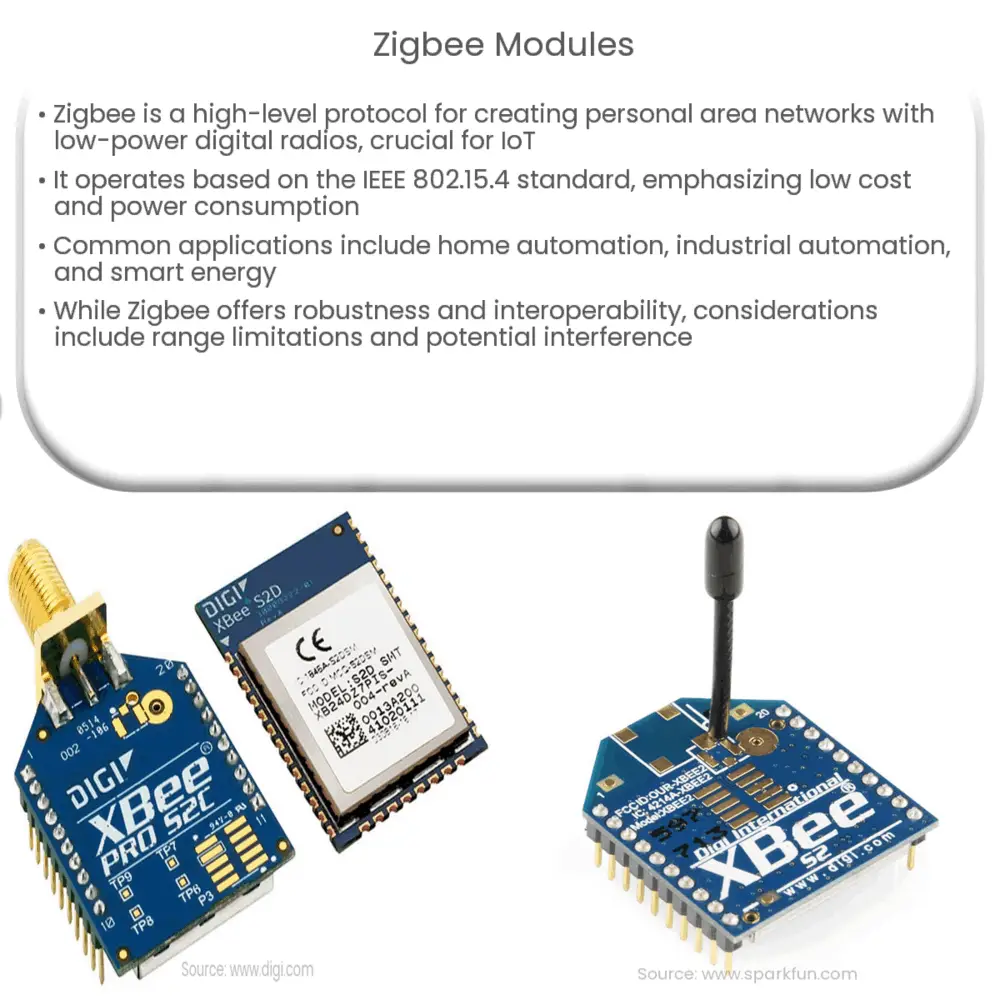Explore the world of Zigbee modules, their benefits, applications in IoT, and how they compare to other technologies in our comprehensive guide.

Introduction to Zigbee Modules
Zigbee is a high-level communication protocol used to create personal area networks with small, low-power digital radios. Zigbee modules are compact, low-power, and robust wireless modules that support this protocol, serving as key components in modern Internet of Things (IoT) systems.
Working Principle of Zigbee
Zigbee modules function on the basis of the IEEE 802.15.4 standard, designed for low-rate wireless personal area networks (LR-WPANs). The technology’s primary features are its low cost and power consumption, ensuring longer battery life, which is a crucial factor for most IoT devices.
The Zigbee protocol is designed to carry out control systems and perform tasks with minimal human intervention. A common application of Zigbee is in home automation systems, where it is used to control lighting, heating, air conditioning, and security devices, among other things.
Benefits of Zigbee Modules
- Low Power Consumption: Zigbee modules are designed to consume less power, making them ideal for battery-powered devices in wireless control and monitoring applications.
- Robustness: Zigbee provides robust and reliable communication. It uses a mesh network architecture, which provides multiple pathways for data, enhancing the reliability of the system.
- Interoperability: Zigbee modules can operate with devices from different manufacturers, fostering a high degree of interoperability within the ecosystem of Zigbee-enabled devices.
Zigbee Module Application Areas
Due to their robustness, low power consumption, and flexibility, Zigbee modules find extensive applications in various domains. Some of these domains include:
- Home Automation: This is arguably the most popular application of Zigbee. It is extensively used for controlling home appliances, security systems, and energy management systems, among other things.
- Industrial Automation: Zigbee modules are utilized in industrial applications for controlling machinery, environmental factors, and energy management.
- Smart Energy: In smart grid networks, Zigbee modules enable communication between energy meters and utility companies, allowing for more efficient energy management.
Zigbee modules, due to their diverse applications and advantages, have become a cornerstone in the rapidly evolving landscape of IoT.
Zigbee Versus Other Technologies
When comparing Zigbee to other wireless technologies like Bluetooth and Wi-Fi, the advantages of Zigbee become clear. For example, Bluetooth is designed for short-range, one-to-one connections, and Wi-Fi is aimed at high-bandwidth, short-range communication. However, Zigbee, with its low-power, low-cost, and mesh networking capabilities, stands out for IoT and similar applications, where devices might be spread out over a large area and not always in close proximity to each other.
Important Considerations when Implementing Zigbee
Despite its numerous advantages, there are factors to consider when implementing Zigbee. These include:
- Range: Although Zigbee operates effectively within a range of up to 100 meters, this can significantly drop when faced with obstacles, such as walls and floors.
- Interference: Zigbee operates in the crowded 2.4 GHz frequency band, shared by Wi-Fi, Bluetooth, and other devices, which can cause interference.
- Compatibility: Although Zigbee modules are generally interoperable, not all devices are compatible due to variations in the Zigbee profiles used by different manufacturers.
The Future of Zigbee
Looking towards the future, Zigbee is likely to play a significant role in the development and proliferation of smart homes and cities. With advancements in technology, the issues related to range and interference can be mitigated, leading to wider adoption of Zigbee modules.
Conclusion
In conclusion, Zigbee modules serve as an integral part of IoT systems, providing robust, low-cost, and low-power wireless communication. Their applications span diverse sectors such as home automation, industrial automation, and smart energy, solidifying their place in our increasingly connected world. Despite some challenges such as range limitations and potential interference, the promise and flexibility of Zigbee modules ensure their continued relevance and growth in the future.

